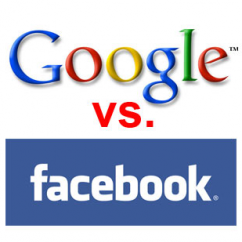Articles and News
Which Gets Better Results For Jewelers’ Ads: Facebook or Google? July 16, 2014 (0 comments)

Merrick, NY—One of the biggest challenges of pay-per-click advertising online is getting the most value for your investment.
The two biggest players in that space are Google’s AdWords and Facebook. But what works better for a luxury jeweler? We already know from L2 ThinkTank research that social media engagement is higher in the jewelry and watch category than for almost any other luxury goods, so that makes Facebook a highly appealing option. But “just Google it” has become part of our everyday language and behavior, showing how much influence the search engine has. And someone on a mission to find a jeweler nearby may not think to look on Facebook first.
According to an article on business2community.com, both have advantages and disadvantages. With the right keywords, Google has the potential to reach a huge audience. Typically, paid advertisements through Google AdWords will show up in prominent positions on the first page of a user’s search results, boosting the chances of visits to your website—and, by extension, possibly your store. AdWords also can be targeted by geographic location, keeping results truly relevant. So a list of keywords such as “jewelers, diamonds, Rolex, engagement rings, Richmond, VA” is a powerful pay-per-click ad choice, because you can get your store’s information placed prominently in front of someone who is searching for diamonds or jewelry in your area.
The downside of Google AdWords, however, is that the cost of keywords—especially in popular categories—has risen sharply, and without proper management of your account you can find yourself spending far more time and money on it than you ever planned to do.
Facebook’s advantage is its popularity. Facebook is installed on three out of every four smartphones, says B2C, and its traffic patterns are comparable to Google.
A big advantage of Facebook is the ease of creating a marketing campaign: you can simply use your business page for posts with a call-to-action, say, to visit your company’s website. You don’t have to create a paid ad, but if you do, you have much more control than on Google. You can target by age, gender, location, interests, and more—something that can’t be done on regular search engines, and Facebook also makes analyzing results fairly easy.
The downside of Facebook is that only Facebook users see the ads, so click through rates are lower than AdWords. And beware of fraud: sites that promise you 500 “likes” for a certain sum often are creating spam accounts, not generating genuine fans. And Facebook ad costs are increasing by about 10% a quarter, says B2C.
Still, both have distinct advantages that can be helpful for small businesses to advertise online. Read more here.
Separately, Wordstream.com, maker of Internet marketing software, suggests Facebook may be better for building brand awareness, sending a specific message, or targeting a message to specific demographic groups, while Google offers far more display advertising choices and is where people go when looking for something specific with the intent of making a purchase.
Read Wordstream’s analysis here.







